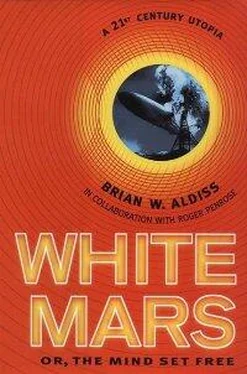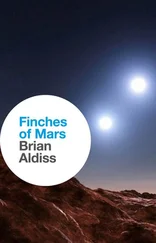Brian Aldiss - White Mars
Здесь есть возможность читать онлайн «Brian Aldiss - White Mars» весь текст электронной книги совершенно бесплатно (целиком полную версию без сокращений). В некоторых случаях можно слушать аудио, скачать через торрент в формате fb2 и присутствует краткое содержание. Год выпуска: 1999, ISBN: 1999, Издательство: Little, Brown UK, Жанр: Фантастика и фэнтези, на английском языке. Описание произведения, (предисловие) а так же отзывы посетителей доступны на портале библиотеки ЛибКат.
- Название:White Mars
- Автор:
- Издательство:Little, Brown UK
- Жанр:
- Год:1999
- ISBN:0-316-85243-0
- Рейтинг книги:5 / 5. Голосов: 1
-
Избранное:Добавить в избранное
- Отзывы:
-
Ваша оценка:
- 100
- 1
- 2
- 3
- 4
- 5
White Mars: краткое содержание, описание и аннотация
Предлагаем к чтению аннотацию, описание, краткое содержание или предисловие (зависит от того, что написал сам автор книги «White Mars»). Если вы не нашли необходимую информацию о книге — напишите в комментариях, мы постараемся отыскать её.
White Mars — читать онлайн бесплатно полную книгу (весь текст) целиком
Ниже представлен текст книги, разбитый по страницам. Система сохранения места последней прочитанной страницы, позволяет с удобством читать онлайн бесплатно книгу «White Mars», без необходимости каждый раз заново искать на чём Вы остановились. Поставьте закладку, и сможете в любой момент перейти на страницу, на которой закончили чтение.
Интервал:
Закладка:
When I asked him what the androids were here for, he told me they had been intended to maintain the integrity of the air-tight structures in which we lived. “But I will not trust them. In theory they’re on lease from EUPACUS. You see, Tom, they’re biotech androids, with integrated organic and inorganic components. I ordered BIA Mark XI—the Euripedes. The EUPACUS agent swindled us and sent these Euclids, Mark VIII, obsolete rubbish. I wouldn’t entrust our lives to a mindless thing, would you?”
The androids regarded us with their pleasant sexless faces.
Turning to one of the androids, Poulsen asked it, “Where are you, Bravo?”
The android replied without hesitation, “I am on the planet Mars, mean distance from the Sun, 1.523691 AUs.”
“I see. And how do you feel about being on Mars as opposed to Earth?”
The android answered, “The mean distance of Mars from the Sun is 1.523691 AUs. Earth’s mean distance is 1 AU.”
“Feel. I said feel. Do you think life’s dangerous on Mars?”
“Dangerous things are life-threatening. Plagues, for instance. Or an earthquake. An earthquake can be very dangerous. There are no earthquakes on Mars. So Mars lacks danger.”
“Sleep mode,” Poulsen ordered, snapping his fingers. As we turned away, he said, “You see what I mean? These androids have halitosis instead of CPS. They create hydroxyls. I rate certain plants higher than these androids—plants mop up airborne hydroxyl radicals and protect us from sick-building syndrome…”
When I asked which plants he recommended, Poulsen said that it was necessary to maintain a clean atmospheric environment. Ozone emissions from electronic systems mixed with the chemicals humans gave off to form what he called “sass”—sick air soups. Mary Fangold’s hospital was handling too many cases of sore throats and irritated eyes for comfort. Selected plants were the things to swallow up the harmful sass.
“What can we do to ease the problem?” I asked.
Poulsen replied that he was getting suitable plants into the domes. A consciousness-raising exercise would be the rechristening of streets and alleys with plant names. K.S. Robinson Avenue could become Poinsettia, and K. Tsiolkovski Place Philodendron.
“Come on,” I said. “Who could pronounce Philodendron?”
We both chuckled.
Using my Ambient, I spoke to the YEA from Hobart, Kathi Skadmorr. Her manner was defensive. She looked straight at me and said, “I happened to be viewing Professor Hawkwood’s Living Without Knowing It.”
“I’m sorry to have interrupted you. What do you make of his theory of the coming of consciousness?”
Without replying to my question, she said, “I love learning—particularly hard unquestionable science. Only it is difficult to know what is actually unquestionable. I have so much to take in.”
“There are good technical vids about Mars. I can give you references.”
“So where is the dateline on Mars? Has that been established?”
“We have yet to place it. The question is not important yet.”
“It will be, though. If God wills it.”
I gave a laugh. “God hasn’t got much to do with it.”
I thought I detected contempt in her voice when she replied, “I was speaking loosely. I suppose I meant some higher consciousness, which might well seem like a god to us, mightn’t it?”
“Okay, but what higher consciousness? Where? We have no proof of any such thing.”
“Proof!” she echoed contemptuously. “Of course you can’t feel it if you close your mind to it. We’re awash here with electromagnetic radiation, but you don’t sense it. We’re also awash with each other’s CPS signals, isn’t that so? Maybe consciousness, a greater consciousness—supposing that here on Mars—oh, forget it. Why are you logging me?”
The question somehow embarrassed me. I said, “I was interested in the way you spoke up in our debates. I wondered if I could help in anyway?”
“I know you have been of great help to Cang Hai. But thanks, Dr. Jefferies, I must help myself, and stop myself being so ignorant.”
Before she switched off, a ghost of a sweet smile appeared on her face.
A mystery woman, I said to myself, feeling vexed. Mysterious and spikey.
At one time, a woman called Elsa Lamont, a slip of a person with dyed-blonde hair cut short, came to my office, accompanied by a sullen-looking man I recognised as Dick Harrison. I had marked him out as a possible trouble-maker, although on this occasion he was civil enough.
Lamont came to the point immediately. She said that my talk of terrestrial discomforts had ignored consumerism. It was well known that consumerism was responsible for much greed and injustice. She had worked for a big advertising agency with world-wide affiliations, and had been responsible for a successful campaign to sell the public Sunlite Roofs, at one time very fashionable, though scarcely necessary.
She explained that their TV commercials had been aimed at everyone, although only 20 per cent of viewers could afford such a distinctive luxury item. However the remaining 80 per cent, knowing they could never afford such a roof, respected and envied the 20 per cent, while the 20 per cent understood this very well and felt their status increased by the clever commercial.
Behind Lamont lay a period of art training. She woke one morning realising she disliked the nature of her advertising job, which was to make people feel greedy or ashamed, so she left the agency and worked to become a YEA and visit an ad-free world. Now she asked, would not people on Mars miss commercials, which had become almost an art form?
We talked this over. She argued that we needed commercials to dramatise the concept of unity. She had been trained as an orthogonist at art school, and using orthogonal projection she could create figures on the walkways that would appear to be erect—amusing figures, dancing, walking, holding hands.
At this point she introduced Dick Harrison, saying that he had studied art and would assist her.
It seemed to me that the idea had possibilities. If anyone volunteered to do anything, it was sensible to let them try. She was given Bova Boulevard to experiment on. Soon she and Harrison had covered the street with amusing Chirico-like figures, without faces, dancing, jumping, cheering. From a distance, they did seem to stand up from the horizontal.
It was clever. But no pedestrian could bring themselves to walk on the figures, which meant the boulevard was virtually closed. It was clever, but it was a failure.
However I liked Elsa Lamont’s energy and ideas, and later appointed her to be secretary of Adminex.
Dick Harrison’s future was less distinguished.
In the space we used for our debating hall, many people were already assembled, discussing, arguing or laughing among themselves.
The subject that arose from the chatter and had to be formally addressed was how we should govern ourselves. Beau Stephens, who had long been released from his pillar together with his associates, suggested that he should be in command. His argument was that he remained a EUPACUS official and, when EUPACUS returned in strength, he would have to hand over affairs in an orderly and accountable manner.
Amid boos, his bid was turned down.
An argument broke out. The YEA faction did much shouting. Finally the tall bearded Muslim with whom I had already spoken, Aktau Badawi, rose to speak. He was born in the holy city of Qom, as he reminded us. It seemed that already his English was improving. Later I found that he was taking lessons from a fellow Muslim, Youssef Choihosla.
Badawi said that shouting was never to be trusted. In the Muslim faith there was a saying: “Do not walk on the Earth in insolence”. By and large, the Muslim nations rejected the present way of getting to any other planet; he was here only because he had been elected as a DOP. But he would not walk on Mars in insolence. He was content to be governed, if he could be governed wisely, by people who did not shout. But, he asked, how could they be governed if there was no money? If there was no money, then no taxes could be raised. Hence there could be no government.
Читать дальшеИнтервал:
Закладка:
Похожие книги на «White Mars»
Представляем Вашему вниманию похожие книги на «White Mars» списком для выбора. Мы отобрали схожую по названию и смыслу литературу в надежде предоставить читателям больше вариантов отыскать новые, интересные, ещё непрочитанные произведения.
Обсуждение, отзывы о книге «White Mars» и просто собственные мнения читателей. Оставьте ваши комментарии, напишите, что Вы думаете о произведении, его смысле или главных героях. Укажите что конкретно понравилось, а что нет, и почему Вы так считаете.










